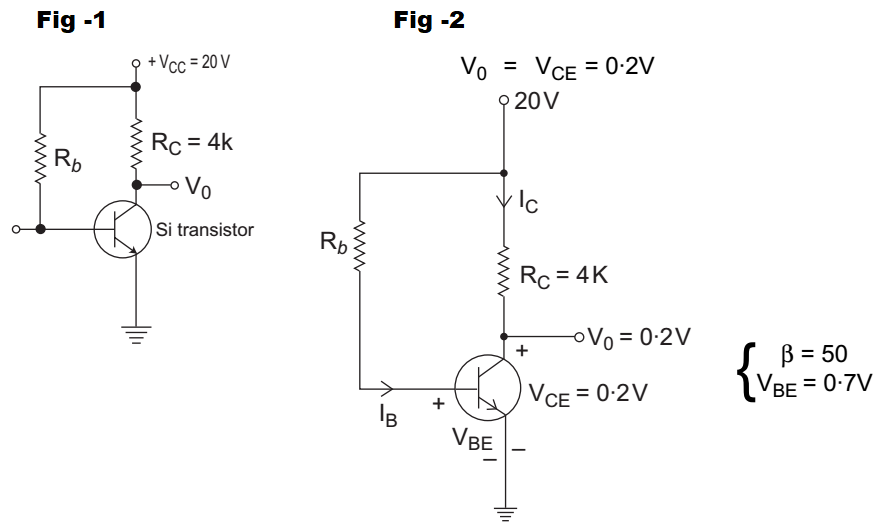Physical electronics devices and ics miscellaneous
- In a transistor hfe = 50, hie = 830 Ω, hoe = 10– 4. Its output resistance when used in CB configuration is about—
-
View Hint View Answer Discuss in Forum
Given, hfe = 50, hie = 830Ω, hoe = 10–4
For CB configuration, hob = hoe 1 + hfe or hob = 10–4 1 + 50 Now, output resistance, Rob = 1 hob = 51 = 510 kΩ 10–4
or Rob ≈ 500 kΩ
Hence alternative (B) is the correct choice.Correct Option: B
Given, hfe = 50, hie = 830Ω, hoe = 10–4
For CB configuration, hob = hoe 1 + hfe or hob = 10–4 1 + 50 Now, output resistance, Rob = 1 hob = 51 = 510 kΩ 10–4
or Rob ≈ 500 kΩ
Hence alternative (B) is the correct choice.
- The circuit given below employs a silicon transistor with the β = 50. The value of biasing resistance Rb for maximum symmetrical swing at the output should be—

-
View Hint View Answer Discuss in Forum
The given circuit (i.e., fig - 1)
In order to achieve maximum symmetrical swing at the output the transistor must be biased in the saturation region.
i.e. V0 = VCE = 0·2V
From below figure, (i.e., fig - 2)IC = VCC – VCE = 20 – 0·2 = 4·95 mA 4K 4K and IB = VCC – VBE RB -3 or RB = VCC – VBE = VCC – VBE IB IC / β = = 20 – 0·7 ≈ 193K 4.95 / 50
Hence alternative (C) is the correct choice.
Correct Option: C
The given circuit (i.e., fig - 1)
In order to achieve maximum symmetrical swing at the output the transistor must be biased in the saturation region.
i.e. V0 = VCE = 0·2V
From below figure, (i.e., fig - 2)IC = VCC – VCE = 20 – 0·2 = 4·95 mA 4K 4K and IB = VCC – VBE RB -3 or RB = VCC – VBE = VCC – VBE IB IC / β = = 20 – 0·7 ≈ 193K 4.95 / 50
Hence alternative (C) is the correct choice.
- For the 2N 338 transistor, the manufacturing specifies Pmax = 100 mW and 25°C free air temperature and the maximum junction temperature Tjmax = 125°C, its thermal resistance is—
-
View Hint View Answer Discuss in Forum
Given,
Pmax = 100 mW
Tambient = 25°C
Ti(max) = 125°C
θ = thermal resistance =?From relation θ = Ti(max) – Tambient = 125 - 25 Pmax 100 mW = 100 °C/W 100 x 10-3
or θ = 1000 °C/W
Hence alternative (C) is the correct choice.Correct Option: C
Given,
Pmax = 100 mW
Tambient = 25°C
Ti(max) = 125°C
θ = thermal resistance =?From relation θ = Ti(max) – Tambient = 125 - 25 Pmax 100 mW = 100 °C/W 100 x 10-3
or θ = 1000 °C/W
Hence alternative (C) is the correct choice.
- If α = 0·98, ICO = 6 µA and IB = 100 µA for a transistor, then the value of IC will be—
-
View Hint View Answer Discuss in Forum
Given, ICO = 6 µA, α = 0·98, IB = 100 µA, IC =?
We know that, IC = βIB + (1 + β) ICOor IC = 
α 
IB + 
1 + α 
ICO 1 – α 1 – α
or IC = 
0.98 
IB + 
1 + 0.98 
6 µA 1 - 0.98 1 – 0.98
or IC = 49 × 100 µA + 50 × 6 µA
or IC = 4900 + 300 = 5200 µA = 5·2 mA
Hence alternative (D) is the correct choice.Correct Option: D
Given, ICO = 6 µA, α = 0·98, IB = 100 µA, IC =?
We know that, IC = βIB + (1 + β) ICOor IC = 
α 
IB + 
1 + α 
ICO 1 – α 1 – α
or IC = 
0.98 
IB + 
1 + 0.98 
6 µA 1 - 0.98 1 – 0.98
or IC = 49 × 100 µA + 50 × 6 µA
or IC = 4900 + 300 = 5200 µA = 5·2 mA
Hence alternative (D) is the correct choice.
- If the differential and common mode gains of a differential amplifier are 50 to 0·2 respectively, then the CMRR will be—
-
View Hint View Answer Discuss in Forum
Given, differential mode gain Ad = 50 and common mode gain Ac = 0·2
CMRR in dB = 20 log10 Ad Ac = 20 log10 50 0.2
= 20 logv10 250
= 10·7 dBCorrect Option: D
Given, differential mode gain Ad = 50 and common mode gain Ac = 0·2
CMRR in dB = 20 log10 Ad Ac = 20 log10 50 0.2
= 20 logv10 250
= 10·7 dB

